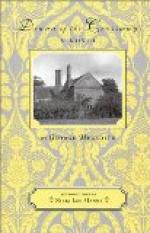One painful sting was caused by the feeling that she could have loved— whom? An ideal. Had he, the imagined but unvisioned, been her yoke-fellow, would she now lie raising caged-beast cries in execration of the yoke? She would not now be seeing herself as hare, serpent, tigress! The hypothesis was reviewed in negatives: she had barely a sense of softness, just a single little heave of the bosom, quivering upward and leadenly sinking, when she glanced at a married Diana heartily mated. The regrets of the youthful for a life sailing away under medical sentence of death in the sad eyes of relatives resemble it. She could have loved. Good-bye to that!
A woman’s brutallest tussle with the world was upon her. She was in the arena of the savage claws, flung there by the man who of all others should have protected her from them. And what had she done to deserve it? She listened to the advocate pleading her case; she primed him to admit the charges, to say the worst, in contempt of legal prudence, and thereby expose her transparent honesty. The very things awakening a mad suspicion proved her innocence. But was she this utterly simple person? Oh, no! She was the Diana of the pride in her power of fencing with evil—by no means of the order of those ninny young women who realize the popular conception of the purely innocent. She had fenced and kept her guard. Of this it was her angry glory to have the knowledge. But she had been compelled to fence. Such are men in the world of facts, that when a woman steps out of her domestic tangle to assert, because it is a tangle, her rights to partial independence, they sight her for their prey, or at least they complacently suppose her accessible. Wretched at home, a woman ought to bury herself in her wretchedness, else may she be assured that not the cleverest, wariest guard will cover her character.
Against the husband her cause was triumphant. Against herself she decided not to plead it, for this reason, that the preceding Court, which was the public and only positive one, had entirely and justly exonerated her. But the holding of her hand by the friend half a minute too long for friendship, and the over-friendliness of looks, letters, frequency of visits, would speak within her. She had a darting view of her husband’s estimation of them in his present mood. She quenched it; they were trifles, things that women of the world have to combat. The revelation to a fair-minded young woman of the majority of men being naught other than men, and some of the friendliest of men betraying confidence under the excuse of temptation, is one of the shocks to simplicity which leave her the alternative of misanthropy or philosophy. Diana had not the heart to hate her kind, so she resigned herself to pardon, and to the recognition of the state of duel between the sexes-active enough in her sphere of society. The circle hummed with it; many lived for it. Could she




